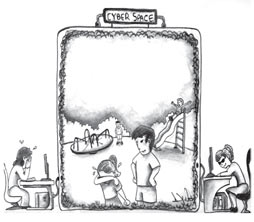
Bullying, something most children experience at some point on the playground while growing up, has, like most other things, gone online.
While this phenomenon has remained relatively unstudied, it is undoubtedly continuing to persist. Spend just a few minutes on YouTube or any other popular forums with “regulars” and you will observe it first hand.
Cyber bullying can get particularly nasty, and when coupled with a fragile or damaged ego, the victim might resort to injuring him- or herself.
Case in point is 13-year-old Megan Meier of Dardenne Prairie, Mo. After what seemed like a blossoming online relationship with 16-year-old Josh Evans on popular networking site MySpace, Evan’s once flattering messages suddenly turned to dislike for young Megan.
According to The Associated Press, after more than a month of messaging each other, Megan received a message Oct. 15, 2006, that said, “I don’t know if I want to be friends with you any longer because I hear you’re not nice to your friends.”
Cruel bulletins from Evan’s MySpace account also began popping up, saying things like, “Megan Meier is a slut. Megan Meier is fat,” the AP said.
At the time of the exchange, Megan was on medication for suffering from bouts of low self-esteem. Confused and devastated by the messages, on Oct. 16, a day after receiving the first message that hinted at something being wrong, Megan hanged herself in her bedroom closet.
But the parents later discovered that “Josh Evans” never existed. The person behind the fake 16-year-old’s profile was the mother of a former friend of Megan. Originally, the mother created the profile to see if Megan was saying mean things behind her daughter’s back.
The mother was never charged with any crime because there are currently no laws dealing with online harassment.
Until such legislation is written into existence, cyber bullying needs to be moderated by the users themselves. If Megan Meier’s suicide teaches us anything, it is that parents need to be involved with their children’s relationships—be it in person or online.
While the ability to hide behind a profile name and an avatar creates a false sense of detachment from the universal rules of social conduct, those rules are not dissolved once someone sits down at a keyboard. If anything, they should be glorified all the more.
Perhaps the impersonality of a computer monitor, coupled with thousands of miles of Internet cable, cause people to forget that behind these silly screen names exist minds and emotions that are altogether human.
While the Internet is as primitive as it is untamed—we, the users, are not. As humans, we have the power to willfully impact those whose lives we come into contact with daily, whether online or otherwise.
But it is our hope that as the Internet continues to evolve, so will the communities that occupy it.
Otherwise, we might be forced to apply today what Albert Einstein said years ago, “It has become appallingly obvious that our technology has exceeded our humanity.”

























